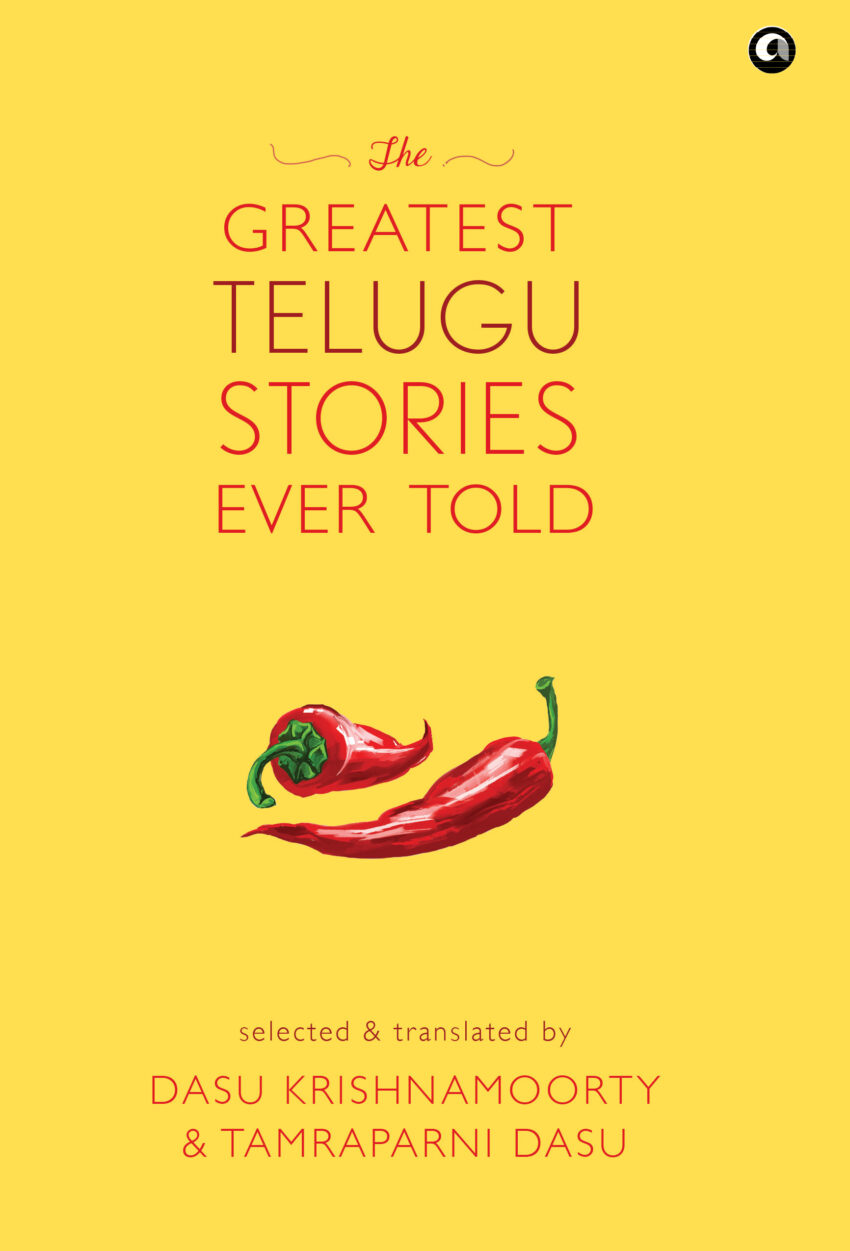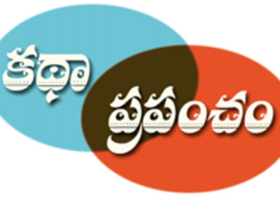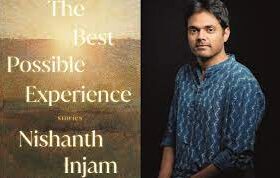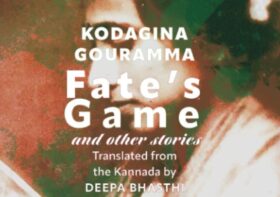Q&A with Tamraparni Dasu on translating from Telugu to English

The Greatest Telugu Stories Ever Told is a recently published anthology of Telugu short stories in English translation. Dasu Krishnamurthy and Tamraparni Dasu, a father-daughter duo, translated the book and Aleph Books published it. This is an email interview with one of the translators – Tamraparni Dasu. Pustakam.net did several interviews over the past 13 years (see here). This is perhaps only our second interview focusing on translation. The first was with Garikapati Pavan Kumar and Sangeetha, on translating Telugu poetry into Assamese, in 2010 (see here). A huge thank you to Dr Dasu Tamraparni for taking time out to do this email interview!
- Can you tell us a little bit about your background and how you got interested in translating Telugu literature?
I was born in Vijayawada, but moved out of Andhra Pradesh when I was 4 years old, first to Ahmedabad and then to Delhi where I had all my schooling. I finished my masters and left for the University of Rochester to do my PhD in mathematical statistics. I joined AT&T Bell Laboratories as a research scientist in 1990 and recently retired to focus on my literary activities.
My mother was particular that I learn Telugu so she taught me at home, and we always had Telugu magazines and novels at home to improve my reading. When my son was born in the USA, I wanted him to be familiar with Telugu literature and so translation became a focus.
2. You are also a writer yourself, apart from being a translator. I saw you post about your novel which is in progress now. How is the relationship between you as a writer and you as a translator?
That’s a very interesting question. As a writer I appreciate the wonderful characters and stories that I translate, particularly those that are so different from my lived experience, for e.g., Predators (Laakulu) by Syed Saleem or Festival of Love (Molakala Punnami) by Vempalli Gangadhar. Translating clarifies my thinking as a writer, by making me acutely aware of the use of the right phrase and idiom to truly capture the mood and atmosphere of what I want to say in my story.
3. Did you consider writing in Telugu or translating into Telugu? If not, why not?
Telugu, like most Indian languages, is a much more complex language than English. Spoken Telugu is quite different from literary Telugu. And I don’t have the same literary depth in Telugu as I have in English, unfortunately. I can appreciate good Telugu writing, but as you know being an NLP expert, it’s one thing to read and understand, but quite a different thing to create an original work.
4. Do you have a process for writing you would like to share with aspiring writers?
I started writing as a stream of consciousness story teller, to amuse myself. However, as I wrote I became aware of the flaws and started consciously to think about things like point of view, structure, pace, things that are probably taught in MFA courses. But it was fun to discover them organically. I don’t really have a process but I do write a first draft of each chapter longhand and when I type it up, that’s like a revision that helps me find disconnects, and add detail. I joined a writers’ group recently which has been hugely helpful.
I would suggest writing as much as possible without judging yourself. It is hard to do, but it is best to let things flow naturally and then rewrite. Each rewrite changes, for me at least, the characters and plot in fairly significant ways, until the characters have a mind of their own and carry the story along a natural arc.
5. Can you tell more about your venture- India Writes Publishers?
When my mother died twenty years ago, my father came to live with us. He worked on political commentary but wanted something substantial to keep him occupied. We decided that translating would be a good thing to help young people growing up here in the USA to get acquainted with their heritage. At the same time, we wanted to support writers in India. We founded IndiaWrites and started translating and paid the writers of the original stories…which was not common in those days. The writers were happy and we were able to run a free monthly online magazine called Literary Voices of India for 6-7 years. It was very well received. By then we published our first anthology with Rupa, The Santoshabad Passenger and Other Stories. We didn’t have the bandwidth to continue the monthly magazine, but we continued to translate stories. And we were able to bring out our second volume of translations with Aleph Book Company this year.
On your recent book and translation in general
6. Tell us about your recent translation effort with Aleph Books – “The Greatest Telugu stories ever told”. How did it start? How did you choose your stories? What was the process like? Etc.
We published our first volume with Rupa & Co. in 2010, called “The Santoshabad Passenger and Other Stories.” We continued to translate stories after that and started looking for a publisher. As luck would have it, we were approached for permission to reprint our translation “Spate” in Frontline and that led to an introduction to Aleph.
7. You worked with your father on this book – how did it happen? How did you distribute the translation work and support each other?
We screened more than a 100 Telugu stories and selected those that both of us liked. My father would then take a first pass over the translation, I would work with that, compare it to the Telugu original, and we would discuss and iterate until we both felt it was good. I would then make a final pass ready for publishing, and we would both check it one last time.
8. Who are your target readers?
Our goal is to make Telug literature accessible through translation to anyone who likes reading good fiction, just as we all grew up reading translations of Russian, French, Arabic authors and writers in other Indian languages like Mahadevi Verma, Sharat Chandra and Premchand.
9.What do you like and hate about translation?
- Specifically, what are some challenges you encountered while translating from Telugu to English?
- What were some easy issues to address?
- How do you decide what words to translate and what to leave out and add a gloss? How are idioms translated?
9-12: Translation is tricky–some words are culture specific, for example “baava” which loses its oomph in plain English as “cousin.” That aspect is both challenging and exciting as it sets apart truly good translations. When you are able to find the right words and cadence in a sentence that matches the original, it is truly satisfying. In contrast, there is also a temptation to editorialize when there are words or ideas that are offensive or cruel, as also the urge to add in a little description here and there to explain better. But one has to stay true to the original, in content and intent at all times, otherwise it is a disservice to the original writer.
13. What are your experiences with translating dialects?
That’s a tough one! We try our best to capture the tone and voice of the writer, e.g., in Madhurantakam Rajaram’s Exile (Agnyaathavasam.)
14. What was the reviewing/editing process like for the translations you did? How do you see the role of an editor in a translation versus an original?
We had an excellent copywriter who not only focused on the language but also carefully clarified the translation of words like thaayilam and cultural use of vendi kancham. I personally feel that editing a translation is much tougher, like verifying someone else’s code to ensure it does what it purports to do, while editing an original is more like debugging. But that’s purely my opinion.
On reading
15. Who are your favorite authors in Telugu?
I am much more widely read in English than in Telugu, but I have enjoyed reading all the authors we have translated–Syed Saleem, Khadeer Babu, Addepalli, and of course classics like Chalam and Gurajada Appa Rao. I have also read best sellers by my menamama, the late Sri Prasad (Palaparthy Ramaprasad). He wrote historical fiction–Appaji, Yugandhar, Roshanara. His novel Appaji was used without being credited as the story of the blockbuster 1962 movie Mahamantri Thimmarusu.
16. Who are your favorite authors in English – Fiction and Non-fiction?
I read mostly fiction, any nonfiction I read is mostly articles in newspapers and magazines, mainly the New Yorker. I have been obsessed with different authors at different points in time–in the last couple of decades it’s been Saramago, Marquez, Rushdie, Doris Lessing, Anita Desai. One of the most remarkable books I have read in a decade is Shuggie Bain by Douglas Stuart. It is a stunning, unique and powerful book that just mows you down. But that’s the only book of his I’ve read.
17. As a reader, how do you see the current Indian English literature?
It’s alright, it has become quite predictable–I am fed up with the immigrant experience or chronicles of some personal angst. I am at a point where I want to be bowled over by the beauty of the language (early Rushdie), or depth of thought (Naipaul) or vividness of characters. I think Amitav Ghosh’s Sea of Poppies had potential but it became too busy and cluttered, and started tripping over its own cleverness.
18. Do you read contemporary Telugu literature?
Yes, but mostly based on recommendations and referrals from friends. At the moment I am reading Smt. P. Sathyavathi’s short story collection. I know how to curate my English reading because there are so many authoritative sources of referrals like the New York Public Library which have online forums where they recommend books based on your likes and dislikes. That’s how I found Shuggie Bain. But being here in the USA, far away from the Telugu literary scene in India, access as well as context (book events, seminars, literary buzz) become difficult.




Dr.Sannihith
Hi ,
iam Dr.Sannihith , telugu writer.
i want to give my telugu novel for translation to English. And it should be published by popular publishing house.
kindly help me regarding this
thank you
Tamraparni Dasu
Hi Vrinda! Nice to hear from you. It’s available on Amazon. The book sold out and and a second print in underway, expected mid-June. I will convey your regards to my father, he remembers our Hauz Khas days fondly, and remembers you quite well. Hope all is well with you.
Vrinda Honwad ( Chitnis)
Hi Parni
Heartiest congratulations for the success of the book. Pls let me know how to get the book. Is it available on Amazon ? My regards to uncle